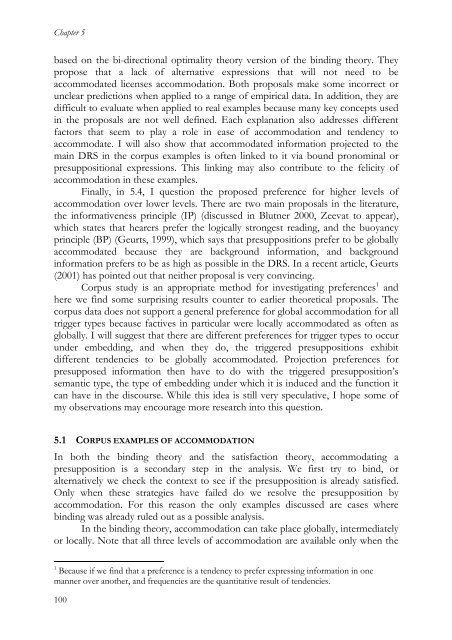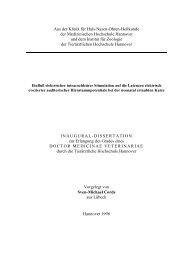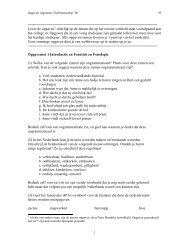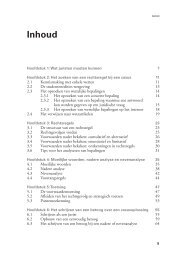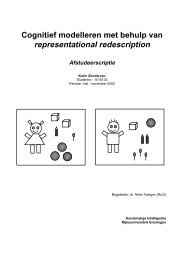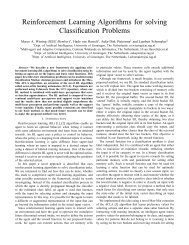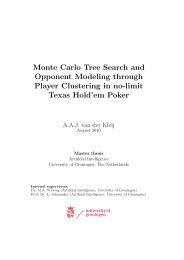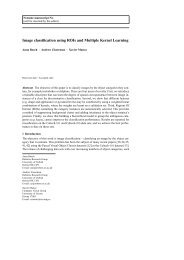Presuppositions in Spoken Discourse
Presuppositions in Spoken Discourse
Presuppositions in Spoken Discourse
Create successful ePaper yourself
Turn your PDF publications into a flip-book with our unique Google optimized e-Paper software.
Chapter 5<br />
based on the bi-directional optimality theory version of the b<strong>in</strong>d<strong>in</strong>g theory. They<br />
propose that a lack of alternative expressions that will not need to be<br />
accommodated licenses accommodation. Both proposals make some <strong>in</strong>correct or<br />
unclear predictions when applied to a range of empirical data. In addition, they are<br />
difficult to evaluate when applied to real examples because many key concepts used<br />
<strong>in</strong> the proposals are not well def<strong>in</strong>ed. Each explanation also addresses different<br />
factors that seem to play a role <strong>in</strong> ease of accommodation and tendency to<br />
accommodate. I will also show that accommodated <strong>in</strong>formation projected to the<br />
ma<strong>in</strong> DRS <strong>in</strong> the corpus examples is often l<strong>in</strong>ked to it via bound pronom<strong>in</strong>al or<br />
presuppositional expressions. This l<strong>in</strong>k<strong>in</strong>g may also contribute to the felicity of<br />
accommodation <strong>in</strong> these examples.<br />
F<strong>in</strong>ally, <strong>in</strong> 5.4, I question the proposed preference for higher levels of<br />
accommodation over lower levels. There are two ma<strong>in</strong> proposals <strong>in</strong> the literature,<br />
the <strong>in</strong>formativeness pr<strong>in</strong>ciple (IP) (discussed <strong>in</strong> Blutner 2000, Zeevat to appear),<br />
which states that hearers prefer the logically strongest read<strong>in</strong>g, and the buoyancy<br />
pr<strong>in</strong>ciple (BP) (Geurts, 1999), which says that presuppositions prefer to be globally<br />
accommodated because they are background <strong>in</strong>formation, and background<br />
<strong>in</strong>formation prefers to be as high as possible <strong>in</strong> the DRS. In a recent article, Geurts<br />
(2001) has po<strong>in</strong>ted out that neither proposal is very conv<strong>in</strong>c<strong>in</strong>g.<br />
Corpus study is an appropriate method for <strong>in</strong>vestigat<strong>in</strong>g preferences 1 and<br />
here we f<strong>in</strong>d some surpris<strong>in</strong>g results counter to earlier theoretical proposals. The<br />
corpus data does not support a general preference for global accommodation for all<br />
trigger types because factives <strong>in</strong> particular were locally accommodated as often as<br />
globally. I will suggest that there are different preferences for trigger types to occur<br />
under embedd<strong>in</strong>g, and when they do, the triggered presuppositions exhibit<br />
different tendencies to be globally accommodated. Projection preferences for<br />
presupposed <strong>in</strong>formation then have to do with the triggered presupposition’s<br />
semantic type, the type of embedd<strong>in</strong>g under which it is <strong>in</strong>duced and the function it<br />
can have <strong>in</strong> the discourse. While this idea is still very speculative, I hope some of<br />
my observations may encourage more research <strong>in</strong>to this question.<br />
5.1 CORPUS EXAMPLES OF ACCOMMODATION<br />
In both the b<strong>in</strong>d<strong>in</strong>g theory and the satisfaction theory, accommodat<strong>in</strong>g a<br />
presupposition is a secondary step <strong>in</strong> the analysis. We first try to b<strong>in</strong>d, or<br />
alternatively we check the context to see if the presupposition is already satisfied.<br />
Only when these strategies have failed do we resolve the presupposition by<br />
accommodation. For this reason the only examples discussed are cases where<br />
b<strong>in</strong>d<strong>in</strong>g was already ruled out as a possible analysis.<br />
In the b<strong>in</strong>d<strong>in</strong>g theory, accommodation can take place globally, <strong>in</strong>termediately<br />
or locally. Note that all three levels of accommodation are available only when the<br />
1 Because if we f<strong>in</strong>d that a preference is a tendency to prefer express<strong>in</strong>g <strong>in</strong>formation <strong>in</strong> one<br />
manner over another, and frequencies are the quantitative result of tendencies.<br />
100


